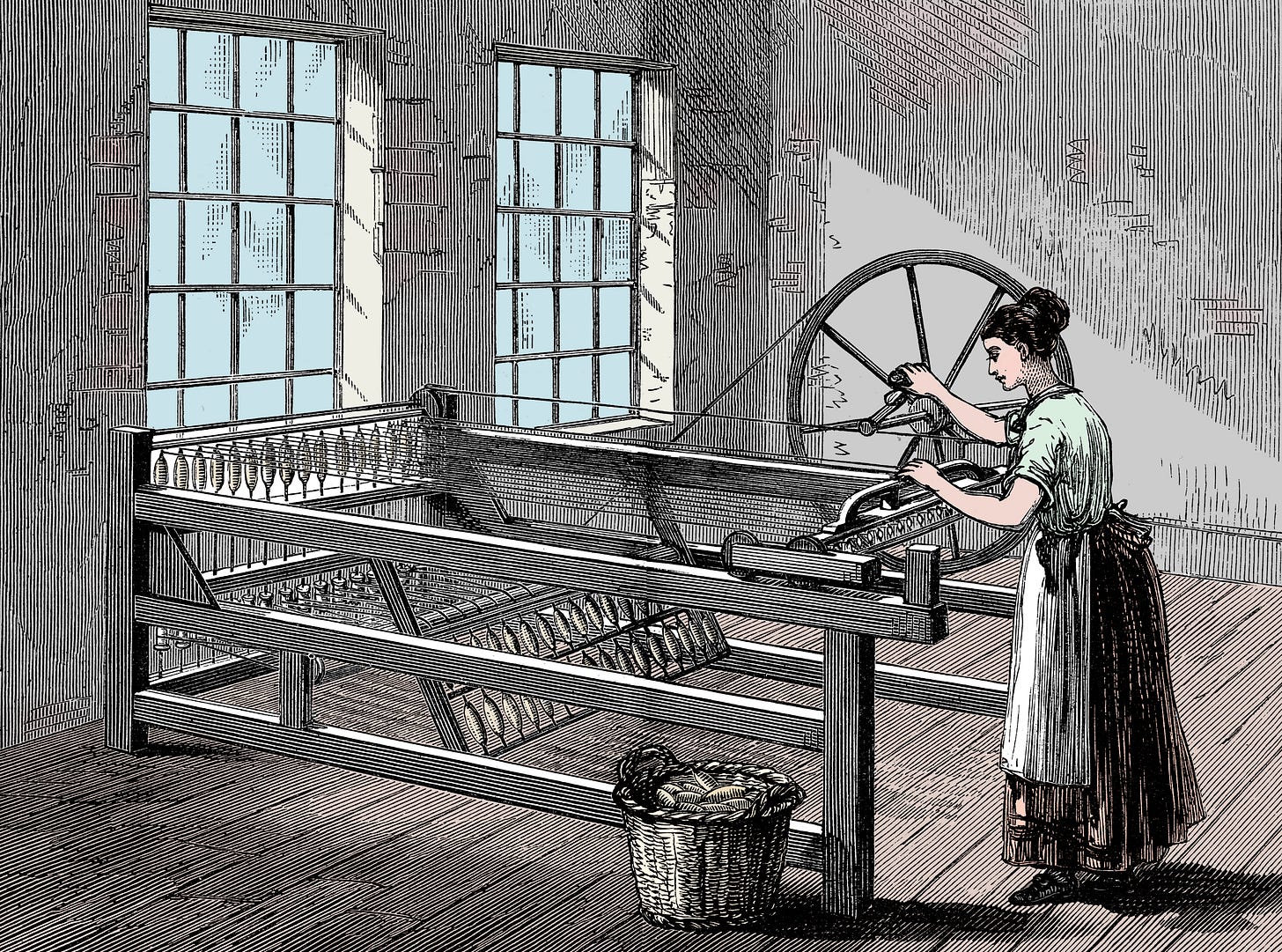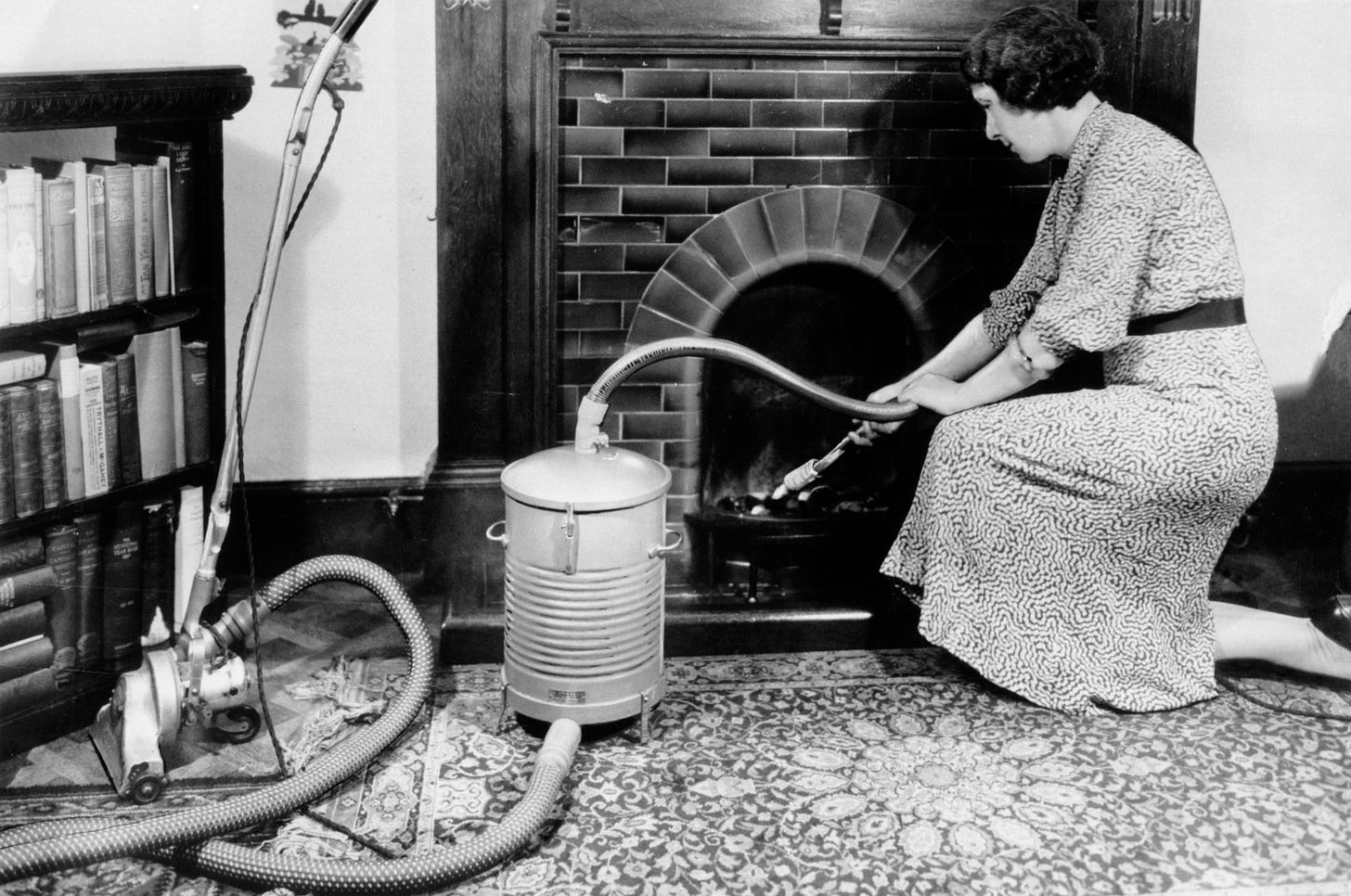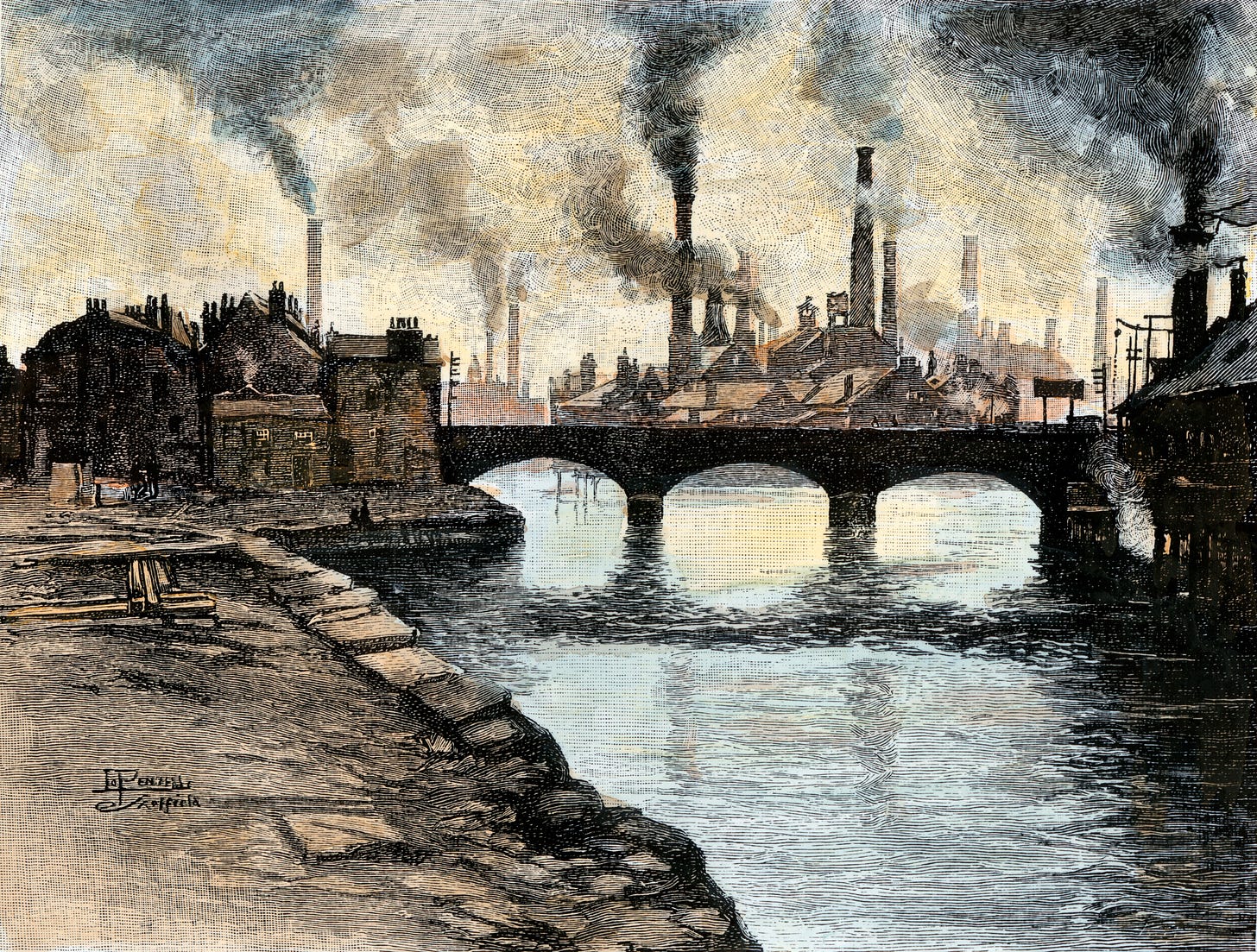Be wary of technology’s big promises, but roll with the changes
From spinning jennies to ChatGPT, the advent of new technology often sparks widespread anxiety, Professor Emma Griffin tells Dr David Musgrove. But the industrial revolution shows we can adapt

I hate my vacuum cleaner with a passion that sometimes surprises me. I was sucked into buying an expensive model a few years ago. When it’s working, it’s great, no doubt about it. But it’s often not working, as it gets clogged up very easily. So I spend a lot of time taking it apart and removing the blockages. Now, don’t get me wrong, I’m sure there is a substantial element of user error at play here, and there is definitely a surfeit of dog hair that I’m asking it to deal with. But, for a labour-saving device, I spend a lot more time labouring on it than it does labouring for me. Quite often, I revert to a broom instead.
One of the most pressing questions for our modern age is how to navigate the rapid advance of technology. From artificial intelligence to automation, we’re told that machines will make our lives easier. But will they? Or are we simply shifting the labour elsewhere? Are we creating more work for ourselves, or creating machines that do all our work and make us obsolete? And how do we cope with it all?
To shed light on this, I spoke to Professor Emma Griffin, a historian of the industrial revolution and author of Bread Winner: An Intimate History of the Victorian Economy (Yale University Press, 2020). Can we take any lessons from her research into working-class life in 19th-century Britain, a period when the white heat of technology was really smoking?
The age of machines

The industrial revolution, which began in Britain in the late 18th century, transformed everything. Machines began to replace manual labour on a mass scale. Factories powered by steam engines and filled with spinning jennies and power looms revolutionised the production of textiles. Coal mining, iron smelting and transport infrastructure all expanded dramatically. It was an age of innovation, but also of anxiety.
“There was always a lot of fear that new technology and new machinery would throw people out of employment,” Griffin explains, “[That] they would de-skill jobs. It would leave people without gainful employment. It would leave them with nothing to do. And it was to be feared.”

This fear was not unfounded. The Luddites – skilled textile workers who destroyed machinery in protest – are shorthand for anti-technology sentiment. (You can find out more about them on our podcast here.) But Griffin urges us to look beyond the myth and examine the broader picture. While some people did lose out, the overall impact of industrialisation was not mass unemployment, but rather a reorganisation of labour.
“In the industrial revolution, some people did lose their employment, but there was always other employment that emerged in its place,” she says. “At the same time as having all of these labour-saving devices that make things like spinning so much quicker and so much easier, you also have a greatly increased demand for cotton goods and for woven goods.”
In other words, machines changed the nature of work, and moved tasks from one area to another, but they didn’t eliminate it.
False advertising

The term ‘labour-saving device’ may be misleading. Just because a machine can do something faster or more efficiently doesn’t mean it reduces the total amount of work in our lives.
“Labour-saving devices are part of technology. They’re part of progress. They are here to stay. They’re not going to go anywhere,” Griffin says. “But if we take a long view and look back from the 21st century, what they don’t seem to have done is turned us all into idle people who are all unemployed and who all have nothing to do.”
That point is well illustrated by a piece in the New Scientist magazine from 1989. Its author, Sue Birchmore, penned a splendidly vituperative article about the impact of technology on her life. She bemoaned the stock of ill-used kitchen appliances that she had amassed, and threw some heavy shade on her vacuum cleaner too. But she also made this point:
“Labour-saving devices don’t seem to have actually reduced the burden of housework; in fact, if all these findings of modern research are to be believed, the time western women spend on housework has gone up over the years, not down. It’s partly that standards have got tougher; a house that was tolerable in 1918 rates as a tip in 1989.”
Birchmore was on the money there. Technology raises the bar, and I don’t just mean about cleaning floors. This is bigger than vacuum cleaners – it’s about the way we live and interact with technology at home, at work and in life generally. It might save time on the one hand, but it’ll likely make more work on the other. That’s annoying if you’re looking to save time on the household chores, but pretty important if you’re thinking about the future of employment, and humanity generally.
The AI revolution
The arrival of artificial intelligence – particularly large language models like ChatGPT – has sparked similar fears to those during the industrial revolution. Will these tools make our jobs obsolete? Will they devalue human creativity and skill? These are the questions we all want answers to. Does history provide them? No, but it gives some context.
“It was really interesting, I think it was in 2023, when I heard about ChatGPT for the first time. It was suddenly all over the news and I didn’t know what it was,” recalls Griffin. “You’re getting a lot of commentators saying, well, this is really bad news for workers because their jobs are going to be made obsolete.”
The arrival of artificial intelligence – particularly large language models like ChatGPT – has sparked similar fears to those during the industrial revolution.
But, just as with the spinning jenny, she believes the reality will be more complex. Jobs will change. Some will disappear. But new roles and needs will emerge too.
“I think in some ways it’s just the wrong framing. It tends to mean that we work differently. Some jobs that had been done by human hands or human ingenuity will obviously now be done through computing,” she says. “Most businesses – and this is exactly what you see with the spinning jenny – they’ll be like, great, we can make more, and we can sell more.”
Making more and selling more ought to mean more work for individuals, and that is what happened in the industrial revolution. You might question whether the little people really benefited much from this, or were just thrust into lives of endless drudgery to the benefit of the mill owners. Griffin’s take is that it’s important not to look back to the past with rosy romanticism.

“The idea that before industrialisation, before the factory, before the city, before the machines, people lived quite nice, happy, wholesome lives. They lived out in the countryside; they did a little bit of gardening; they did a little bit of weaving; they lived in stable family units – and life was nice. And then of course, the factory and the machine come along and decimate all of that. I don’t subscribe to that view because you can only sustain that if you take a really romantic view of what life before the industrial revolution was like.”
Searching for a better life

Emma Griffin’s research into working-class autobiographies from the 19th century (which she discusses in this interview for members on HistoryExtra) reveals a perhaps surprising pattern: many people embraced the move from rural to urban life. They found greater freedom, more varied employment and better wages in the cities.
“Many of the working-class autobiographers I’ve looked at make that journey. They’re born into rural poverty. They grow up and move to the city. And in the city they find all sorts of really appealing things,” she explains. “There’s a vast array of different jobs that people can do in an urban setting. If you live in the village, there is only one job. So, whether you like growing turnips or not, everybody has to join in the work of growing a turnip.”
As technology reshapes the job market, the ability to pivot, to retrain and to find new roles will be more important than ever.
“There will be certain areas and certain things people do that we just won’t be able to continue doing in exactly the same way,” Griffin says. “But I suspect what we’ll find is there’ll be a huge shifting around and reorganisation of the way we do things. And new opportunities will emerge from that.”
That said, she is clear-eyed about the risks. Not everyone will be able to adapt easily. Some skill sets may become obsolete without clear pathways to new employment. The transition will be bumpy for some.
“There will be some tasks, some skill sets from which people will find it difficult to pivot to something else,” she notes. “Those opportunities that open up elsewhere may or may not be ones that they can grasp.”
I think it’s important to look at the whole picture here. Technological changes are not just about jobs and work productivity, or about labour-saving devices at home. They cause shifts in the fabric of society itself. The model of the breadwinner was born out of the move to factory production in the industrial revolution, and that radically changed the dynamics of family life, and the opportunities for men and women, and children, at the time.
In an article that Griffin wrote for HistoryExtra a little while ago (available here for our members), she outlined what that meant for people:
“The outcomes of the industrial revolution were, clearly, mixed. Healthy adult men stood to gain the most, enjoying more work, higher wages and opportunities for cultural and political expression. Women were almost wholly bypassed by these developments and, though children were affected by the great demand for labour, for them the results were far from beneficial”.
The changing world of work

There were winners and losers in the industrial revolution. There are going to be winners and losers in the AI revolution. How do you make sure you’re winning more than you’re losing?
Frankly, I’m not sure. But the lesson from history is that flexibility and an open-minded approach are key. Embrace the benefits of new technology, but just be quizzical about the big promises that are made for it.
“I think the big takeaway for me is that, since industrialisation, we’ve lived in a very rapidly changing world, a very fast-moving world,” observes Griffin. “For millennia, people lived pretty much the same kind of life as the life that their parents had lived and their grandparents had lived. Everything was fundamentally fairly similar. And that’s just not the case for us today.”
That pace of change can be disorienting, unmooring and anxiety-inducing. But it’s the world we live in – and it’s not going away. Whether we are well adapted to this flood of novelty is going to become clear over the coming years I suppose. Looking back to the industrial revolution, we can perhaps take solace that people did cope. If you look at their autobiographies, as Griffin has done, you might take a broadly positive view of how it went for people then. She sums it up in that HistoryExtra piece I mentioned earlier:
“This much is clear: we would do well to discard the darker interpretations of this era. The industrial revolution ushered in revolutionary social change, and working people certainly shared in the benefits.”
The pace of change can be disorienting, unmooring and anxiety-inducing. Looking back to the industrial revolution, we can perhaps take solace that people did cope
So is there a bright and cheery message from the past? I’m not sure – artificial intelligence feels like an altogether different prospect to the spinning jenny to me. But maybe I’d have felt similarly anxious about the latter if I’d been alive in the 18th century. And those people who lived through the age of the jenny and the power loom coped and adapted. Undeniably, there was massive social change, and we’re still working through the consequences of that now. But at the time, some people prospered, and found great benefits in the new world. Like them, we should expect, and we’re going to have to accept, ever more change. Griffin’s view – informed by her knowledge of how people fared in the past – is that it’s better to work with change than fight it, and I share that sentiment.
I’ve used AI to help me write this article – I asked it to select some killer quotes from an automatically generated transcript of my interview with Professor Griffin. I asked for quotes that illustrated specific points I wanted to make, and obviously I checked them to make sure they were good and accurate. That’s saved me half an hour of the task, which I’m going to use to go for a run with my dog, to bolster my health and mental wellbeing, and to keep just a few of those labrador hairs on the trails outside, rather than inside that pesky vacuum cleaner. That’s my way of making the machines work for me.





What I didn't consider here is how far AI is a tool for historians to help them find new ways to interrogate their sources. I'd be fascinated to know if people are using it to look at sources in completely new ways